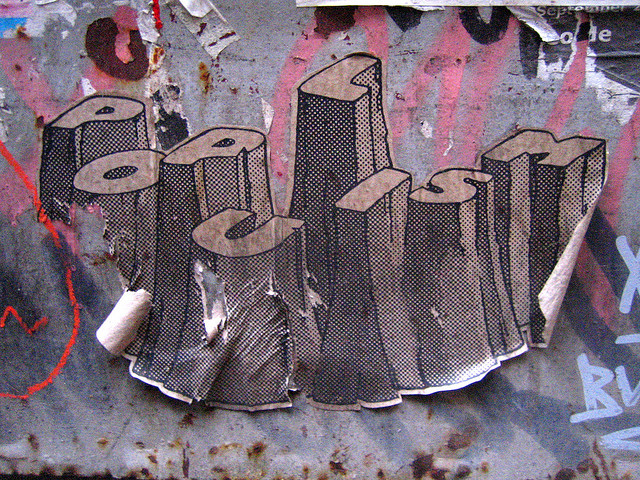Populism has been used to describe countless and often conflicting political parties, but it can be defined
There are different area-based bodies of literature on populism, which generally define the concept in slightly different ways. As a result, the term ‘populism’ has been attached to a wide variety of political actors. Is it an unfortunate coincidence that the same word has been used for completely different parties and politicians, or is it possible to discern the lowest common denominator that these actors share? Matthijs Rooduijn argues that populists in different times and places have four characteristics in common: (1) they emphasize the central position of the people; (2) they criticize the elite; (3) they perceive the people as a homogeneous entity; and (4) they proclaim a serious crisis.

Credit: Dr Case, CC BY NC 2.0
Many political analysts are fascinated by the upsurge of Western European populist parties. Right-wing parties like the United Kingdom Independence Party (UKIP) in Britain and the Front National (FN) in France are increasingly successful, and also left-wing populists like Syriza in Greece and Podemos in Spain are on the rise.
We all recognize populists when we see them, but to most of us it is unclear what exactly makes these parties populist. This is not strange. Populism is a confusing term because it has been applied to a wide-ranging variety of parties and politicians. It points in different contexts to different phenomena. In one case populism can refer to small-scale bottom-up movements, whereas in another case it could denote a radical right political party. Is it merely an unfortunate coincidence that such diverging political actors have all been labeled populist? Or do they actually have something in common? In a recently published article (paywall) I investigate whether there exists a lowest common denominator that all populist actors share.
Populism has been associated with many different features. I make a distinction between features that relate to the ideas of populist actors, characteristics that have to do with the style of populists, and attributes that concern the organization of populist actors.
When it comes to the ideas of populist actors, one feature that is often associated with populism is the centrality of the people. Populists are said to worship the people, and to emphasize the people’s fundamental position at the center of politics. Populism is also associated with anti-elitism. The elite is accused of being alienated from the people, of having no idea what ordinary people find important, and of only representing its own interests. Because of the perceived antagonistic relationship between the people and the elite, the people is conceived of as a homogeneous entity. Populists believe that all ‘ordinary’ men have a shared interest in their opposition against the elite. It has also been argued that populists want to circumvent ‘opaque and complex consensus seeking politics’ by introducing more directness in the form of measures of direct democracy such as referenda, popular initiatives and plebiscites. Often, populism is as well associated with exclusionism. Populists, so it is argued, defend the collective identity of the ‘true’ people against enemies from outside (immigrants, unemployed, or people of another religion or race). To emphasize their message, populists are often said to proclaim a crisis (political, cultural and/or economic).
Regarding style, populists have been claimed to use a simplistic language. Because of their glorification of the people and their despise of the elite, many scholars have argued that populists tend to use a simple language that is understandable for ‘normal’ people and differs from the difficult and formal language of the elite. It is also often argued that populists, to get their message across, make use of a direct communication style. Further, it has been claimed that populists polarize to bring their message of crisis across. They dichotomize the debate and often employ an aggressive language. Finally, populists often create an outsider image. They present themselves as not being part of the elite and as political mavericks.
Organizational characteristics concern the way in which populist organizations are constituted. According to some scholars, centralization of the leader plays a pivotal role. Another alleged organizational characteristic is that populists want a loosely mediated relationship between leader and followers. This means that populists want to get rid of intermediate institutions and organizations that stand in the way of a direct relationship between themselves and their followers.
Which of these characteristics are shared by all populists? To discover what all populist actors have in common, ideally, one would need to study all populists. But because this is practically impossible, I selected six populist actors from backgrounds as divergent as possible in terms of time, space and ideology. Political actors have been included only when most scholars agree that they are populist. The selected populist actors are: Watson’s People’s Party and Perot’s Reform Party in the United States; Perón’s Justicialist Party (Argentina) and Chávez’s MVR/PSUV (Venezuela) in Latin America; and Le Pen’s FN (France) and Berlusconi’s Forza Italia (Italy) in Western Europe.
The analysis indicates that only four of the twelve characteristics which are often associated with populism are shared by all populist actors. Interestingly, all shared features relate to ideas. The first shared feature is that all populists emphasize the central position of the people. What they exactly mean with ‘the people’ often remains unclear. What is clear, however, and this is the second shared feature, is that they seem to have the idea that the people with whom they identify is homogeneous. The third shared characteristic is that they all argue that the people are exploited by a corrupt and selfish elite. The fourth feature that can be found in all six cases is that populists argue that the exploitation of the people by the selfish elite constitutes a serious political, economic and/or cultural crisis.
This suggests that actors labelled as populist actually have something in common, and that it is not a coincidence that they have all been labelled as such. This is an important finding, because it means that we can compare populists in the United States of the nineteenth century with twentieth century populist leaders in Latin America and present-day populist parties in Western Europe.
It also implies that some of the phenomena which are often associated with populism should be discarded as core characteristics of the concept. First of all, not all populist actors are exclusionist. Although a party like FN in France, but also parties like UKIP in Britain or the Partij voor de Vrijheid (PVV) in the Netherlands, propose exclusionist policies, not all populist actors do so. Chávez and Perot, for instance, did not exclude immigrants or people of another race or religion. It is important not to identify populism with exclusionism because that could lead to unwarranted disqualifications of populists.
Second, not all populists are supporters of direct democracy. Although many of them do support direct decision-making by citizens (Perot, Chávez and Le Pen, for instance), some populists want to express the will of the people in another way. Juan Perón, for instance, was not a supporter of direct democracy. He thought that the will of the people would best be expressed by a strong elected leader, who knew what his supporters found important, and who was not hampered by ‘liabilities’ such as parties, parliament and other institutions.
Third, populism is not a specific style of practicing politics. Although many present-day populists employ a rather simplistic language, my analysis shows that not all populists do that. The central ideological document of the People’s Party (the Omaha Platform), for instance, is replete with long-winded sentences and complicated grammatical structures. Moreover, the People’s Party did neither polarize nor presented itself as a full outsider. Also, many present-day populists prefer to communicate with voters directly by means of, for instance, Facebook or Twitter. The People’s Party, however, did not communicate in such a direct way. This does not make this party less populist. The direct communication style is more a characteristic of our modern time, than a feature of populism.
Fourth, populism is not a specific organizational form. Not all populist parties are structured around a strong charismatic leader and not all populist parties are loosely organized. Although charismatic leadership can be a means for populists to become successful, it is not a core ingredient of populism.
We need to realize that populism has often been equated with phenomena that need to be distinguished from the concept. This is problematic because in many cases it has led to unwarranted disqualifications of populist actors and an image of populism as a threat for democracy. A good analysis of populism should be less biased and depart from a more nuanced and less condemnatory approach.
—
Note: This article gives the views of the authors, and not the position of Democratic Audit UK, nor of the London School of Economics. Please read our comments policy before commenting.
—
 Matthijs Rooduijn is a Political Sociologist at the University of Amsterdam
Matthijs Rooduijn is a Political Sociologist at the University of Amsterdam





 Democratic Audit's core funding is provided by the Joseph Rowntree Charitable Trust. Additional funding is provided by the London School of Economics.
Democratic Audit's core funding is provided by the Joseph Rowntree Charitable Trust. Additional funding is provided by the London School of Economics.
Populism has been used to describe countless and often conflicting political …: Democratic Audit UK https://t.co/PIWpqJMnLb
“Populism has been used to describe countless and often conflicting political parties, but it can be defined” https://t.co/D9WIjb52ho
RT @laderafrutal: What is ‘populism’? I avoid the term, but good overview of some ‘populist’ parties in diff times/places… https://t.co/8c…
Populism has been used to describe countless and often conflicting political parties, but it can be defined https://t.co/00XmB0Tbrx
Read my blog about what all populists have in common @democraticaudit: https://t.co/tZYKt4lh3b
The term ‘populism’ has been attached to a wide variety of political actors. They have four characteristics in common https://t.co/tZYKt4lh3b
Populism has been used to describe countless and often conflicting political parties, but it can be defined https://t.co/KfLg0gsVwi